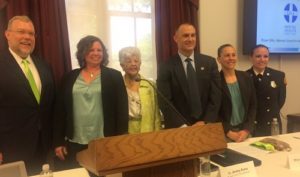This post originally appeared on the Capitol Connector blog. View the original post.
 On Tuesday, May 8th, the National Council for Mental Wellbeing hosted briefings on Capitol Hill to highlight the importance of Mental Health First Aid training in helping communities respond to opioid overdoses and other substance use and mental health crises. The briefing introduced Congressional staff to Mental Health First Aid’s opioid overdose education and naloxone training component. The day’s panel included law enforcement, firefighters/paramedics and community educators from across the U.S. who discussed the impact that Mental Health First Aid has had on their communities and departments.
On Tuesday, May 8th, the National Council for Mental Wellbeing hosted briefings on Capitol Hill to highlight the importance of Mental Health First Aid training in helping communities respond to opioid overdoses and other substance use and mental health crises. The briefing introduced Congressional staff to Mental Health First Aid’s opioid overdose education and naloxone training component. The day’s panel included law enforcement, firefighters/paramedics and community educators from across the U.S. who discussed the impact that Mental Health First Aid has had on their communities and departments.
NALOXONE TRAINING
In response to the opioid epidemic, Mental Health First Aid recently added an opioid overdose education component to its standard training on recognizing and responding to mental health and substance use crises. The City of Dayton, Ohio, often identified as ground zero of the opioid epidemic, recently piloted Mental Health First Aid’s opioid component. Jennifer Cox of Montgomery County Alcohol, Drug Addiction and Mental Health Services, shared that Mental Health First Aid’s curriculum filled a critical community need for more substance use prevention and education.
Cox explained that the opioid component teaches participants common risk factors for overdose, signs and symptoms of overdose and necessary steps for administering naloxone, a lifesaving overdose-reversal drug. While participants are not given naloxone to carry, Mental Health First Aid instructors share with participants local community resources where naloxone is available. Participants also learn the symptoms of opioid withdrawal and how to recognize whether a person has been administered naloxone or not.
OVERDOSE PREVENTION
Naloxone access is particularly important for first responders, who are often first to the scene of an opioid overdose. Mental Health First Aid Instructor Lieutenant Jeremy Romo of the St. Louis County Police Department explained that all his officers have experience responding to overdose calls and that about half have saved a life with naloxone. However, sometimes individuals will not call 911 in an overdose situation for fear that they could be sent to jail or prison, Lt. Romo explained. As a result, it is essential that family members and friends of individuals with substance use disorders also understand how to administer naloxone. “I strongly believe that adding overdose education and reversal training to the Adult Mental Health First Aid curriculum will dramatically increase the number of lives saved,” Romo illustrated.
In Dayton, Mental Health First Aid’s opioid component is already showing tremendous results. Cox shared that, “Since March 2017, there has been an 85 percent decrease in the number of naloxone treatments administered by the Dayton Fire Department and a 67 percent decrease in the number of responses to overdoses. ” She added that while overdose deaths are still occurring, the pace has slowed and the county’s initial projections of overdose deaths were higher by the hundreds than the number of actual reported deaths.
WELLNESS FOR FIRST RESPONDERS
Trooper First Class (TFC) Christine Jeltema of the Connecticut State Police and Firefighter/paramedic Michelle Fayed of Miami-Dade Fire Rescue stressed the importance of funding Mental Health First Aid for first responders. According to Fayed, “firefighters are three times more likely to die by suicide than to die in line of duty.” The unique needs that exist for Fire/EMS workers regarding substance use and mental health and wellness led Fayed to help author a new version of Mental Health First Aid specifically tailored to Fire/EMS populations. Similarly, TFC Jeltema has seen untreated mental illness and substance use disorders wreak havoc in the lives of State Troopers. According to Jeltema, Mental Health First Aid training can make a difference in these situations by provider first responders, “the tools to help each other if our peers are in crisis.”
The briefings were sponsored by Senator Richard Blumenthal (D-CT) as well as Representatives Lynn Jenkins (R-KS), Doris Matsui (D-CA) and the Congressional Mental Health Caucus, co-chaired by Representative Grace Napolitano (D-CA).
TAKE ACTION
Congress is currently deciding funding priorities for FY 2019 – and the National Council for Mental Wellbeing needs your help to ensure Mental Health First Aid makes the list. Over the last few years, Congress has supported funding for Mental Health First Aid trainings for teachers, law enforcement, and emergency first responders and recently increased the program’s annual funding from $14 million to $19 million. Will you take two minutes and urge your legislators to continue supporting Mental Health First Aid training? Take action today!